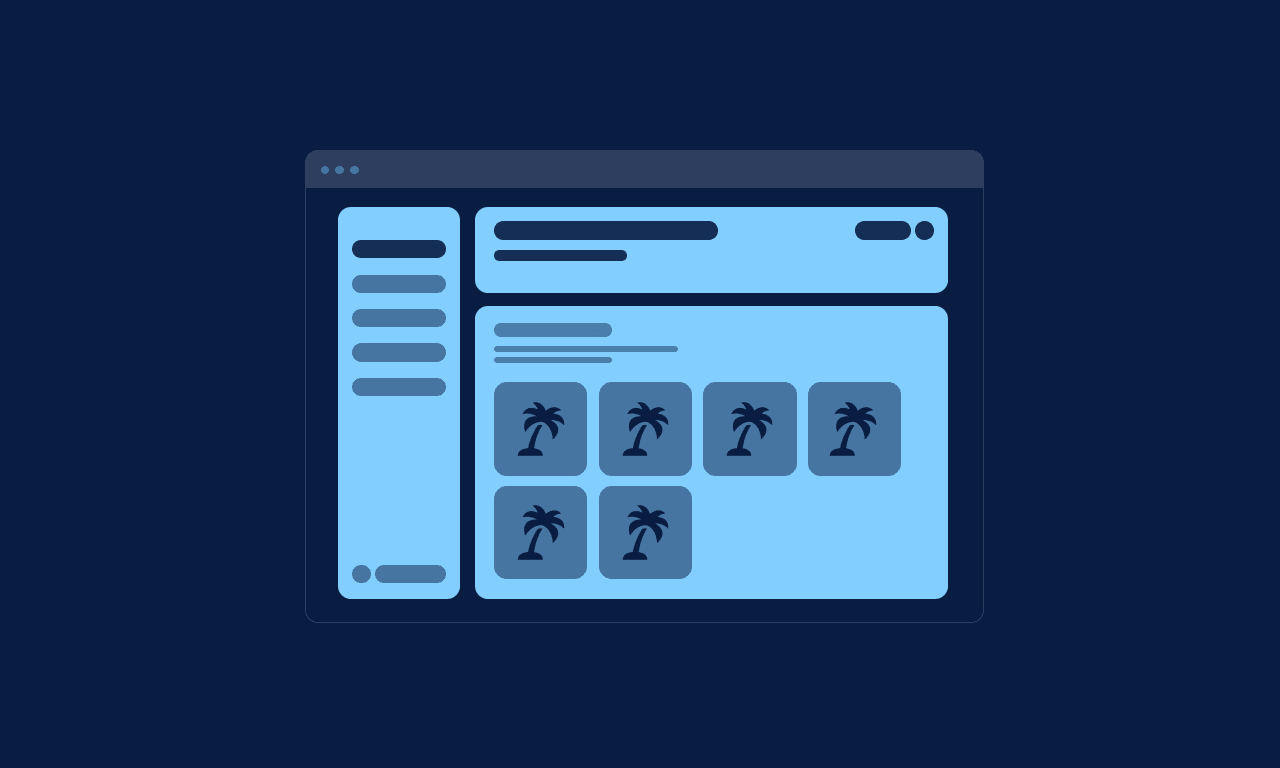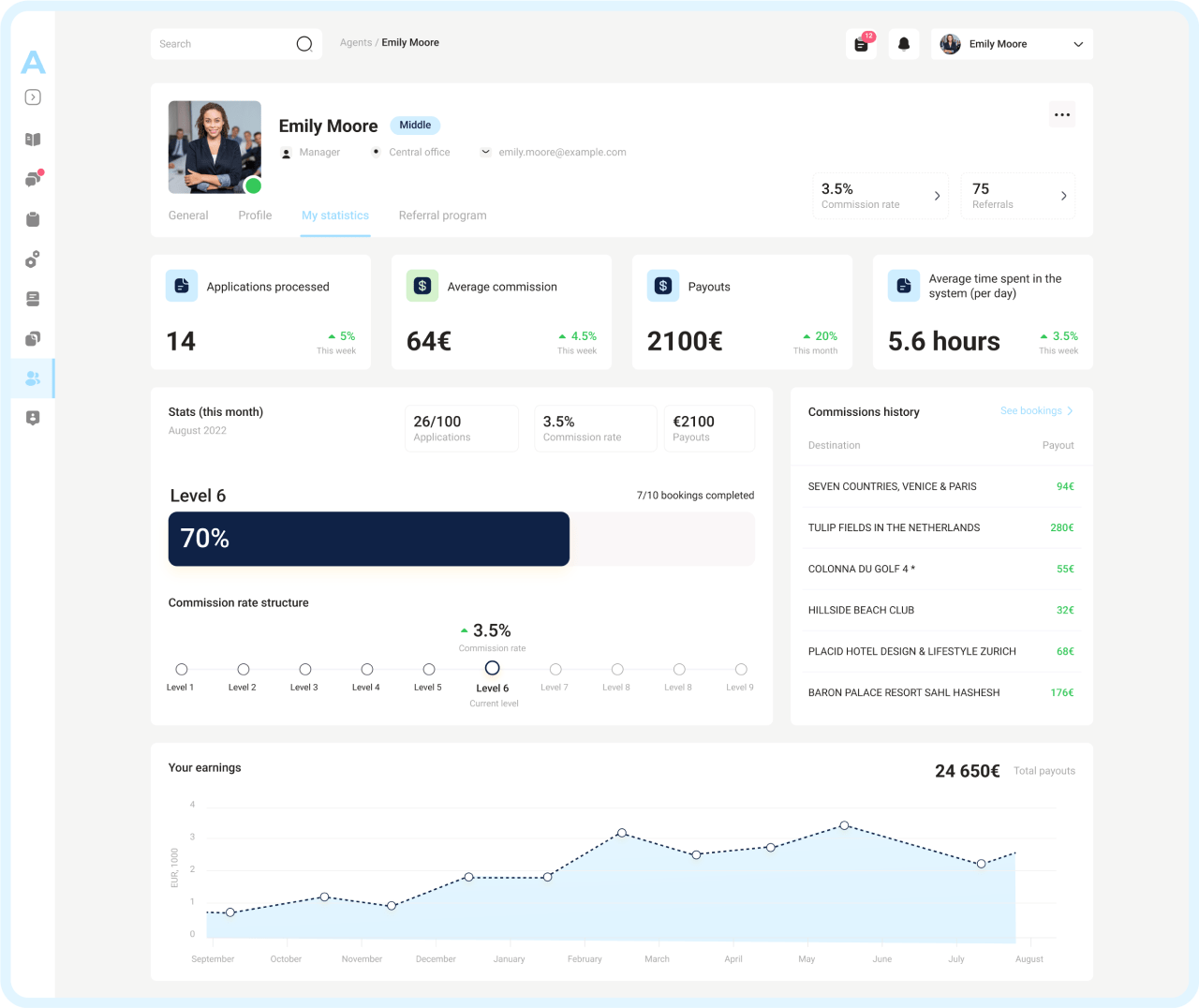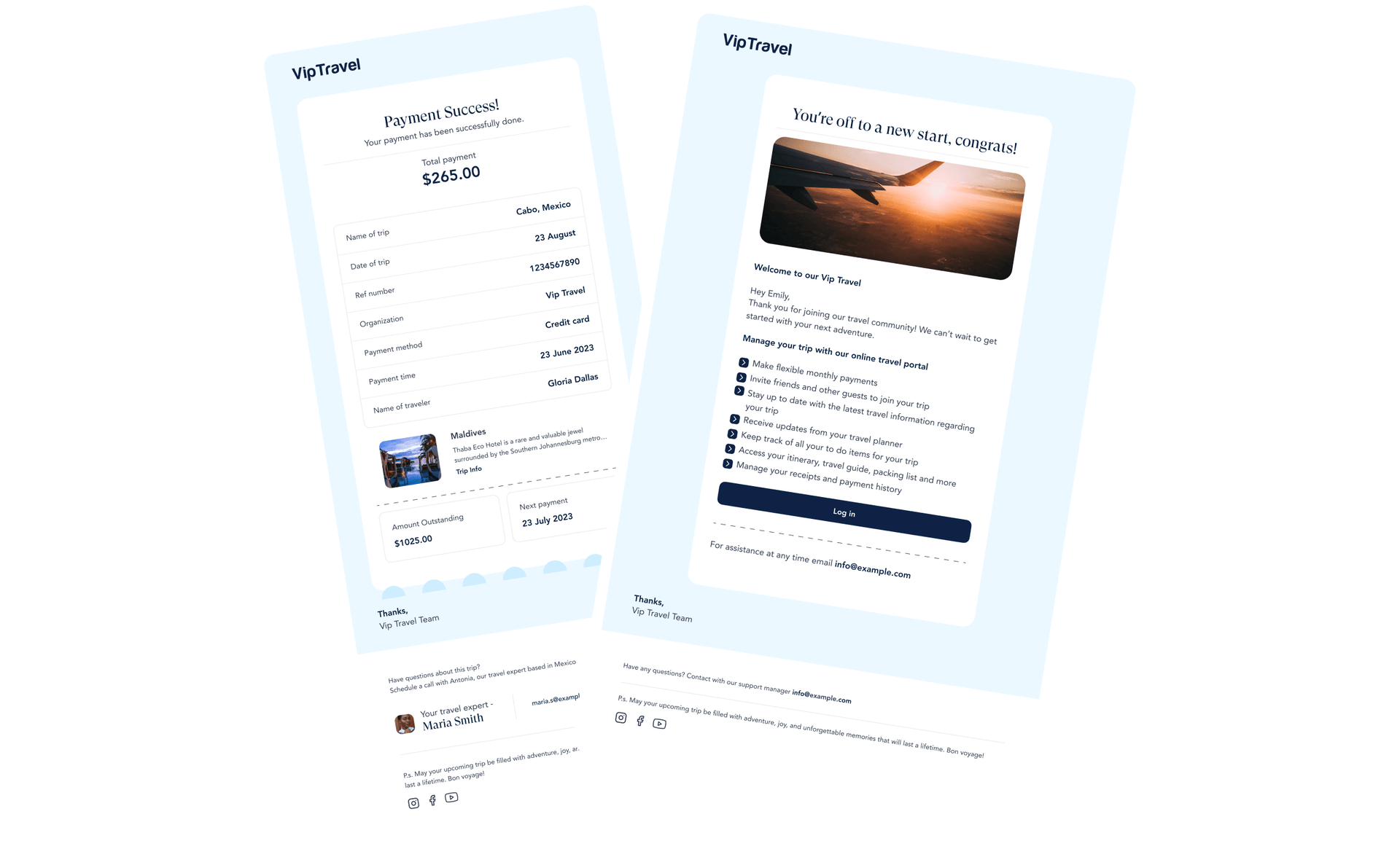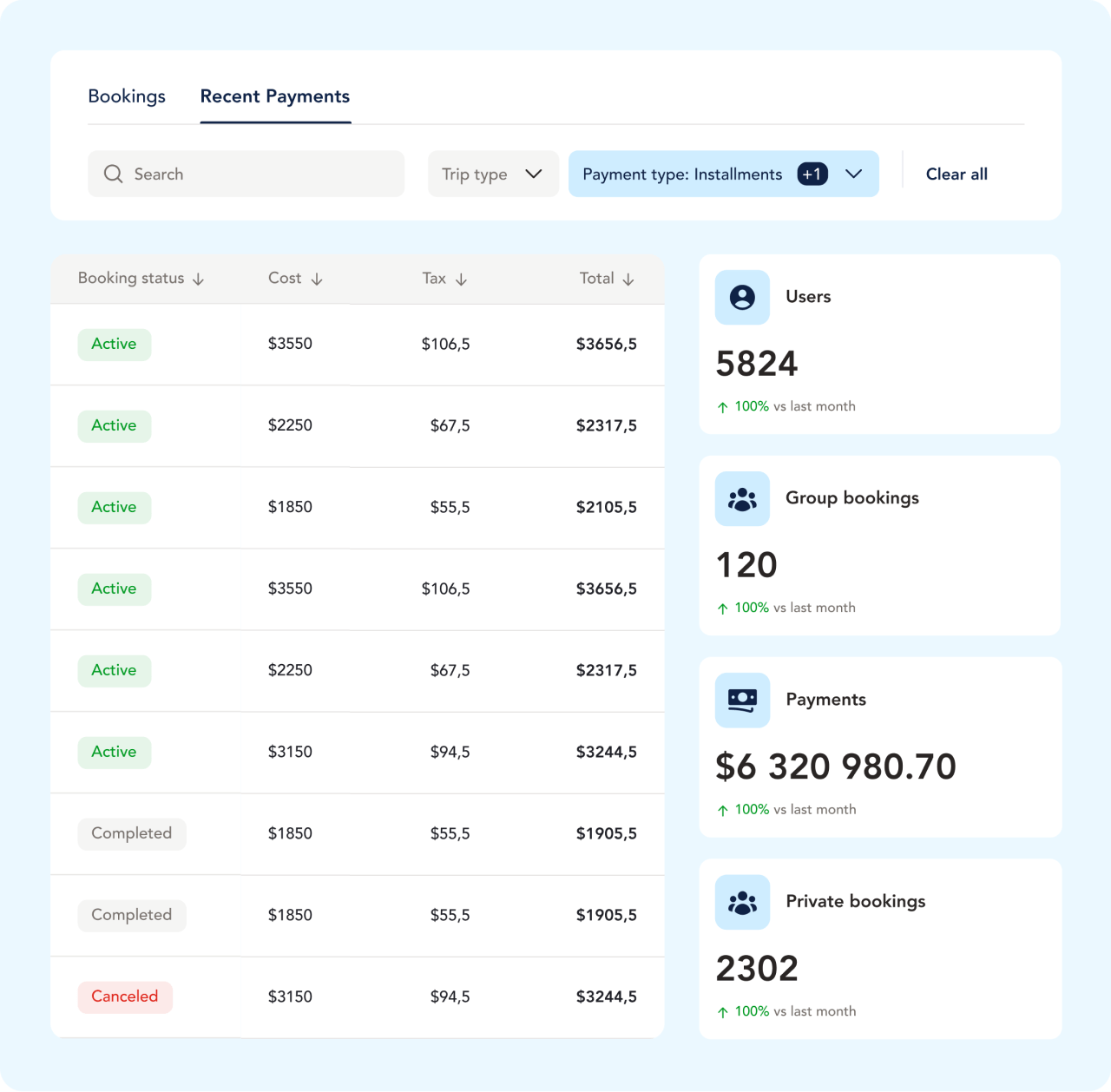What is a travel agency CRM? Features, benefits, and tips
Alex Ragin
Updated Dec 02, 2025 • 11 min read

Efficiently managing customer relationships is crucial to success in the travel industry, just as it is in any other sector. This is why your travel agency needs a customer relationship management system, or CRM — a tailored solution designed to enhance customer service and boost sales.
Whether you operate a small business or a large enterprise with several travel agents, understanding how to utilize travel CRM tools can greatly improve your customer interactions and strengthen your business. Let's explore what a travel agency CRM is, its main features and benefits, and practical tips for its implementation.
What is travel agency CRM software?
Travel agency CRM software is a tailored system that helps travel agencies manage interactions and maintain customer relationships effectively.
Its goal is to automate or significantly simplify the many processes your travel agents handle daily.

This system integrates account management tools, storing detailed customer profiles with contact details, travel preferences, and historical booking data to help your agency streamline operations. It also includes marketing tools aimed at both potential and existing users to offer personalized customer experiences, alongside features for efficient customer service management to address inquiries and issues promptly.
Key features of a travel agency CRM
Centralized customer data management
A customer relationship management system serves as a unified source of truth, centralizing all customer data—from personal details and travel preferences to past bookings, feedback, and communication history. This centralization allows you to deliver personalized experiences and enhance your targeted marketing efforts.
Booking management
The CRM seamlessly integrates with various booking engines and platforms, empowering your travel agents to manage bookings for flights, hotels, tours, and other services directly within the system. This integration streamlines the booking process, increases efficiency, and minimizes errors.
Communication tools
A robust CRM for travel agencies includes integrated communication channels such as email and SMS, facilitating seamless interactions with multiple customers before, during, and after their trips. It also collects communication analytics to refine future interactions and customer engagement strategies.
Marketing automation
A travel agent CRM automates marketing campaigns based on customer data and behaviors, including targeted offers, seasonal promotions, and reminders for trip planning. The system also provides tools to track and optimize your marketing campaigns through performance analytics.

Sales management
CRM software includes tools for tracking sales performance, leads, and conversion rates, aiding in the management and forecasting of sales targets. It offers valuable insights that help refine sales strategies. Additionally, enhanced visualization tools in the CRM allow for a clearer understanding of data and trends.
Customer service and support
A robust CRM for travel agencies equips you with effective tools for managing service requests, complaints, and feedback. It facilitates tracking and resolving issues swiftly, maintaining high satisfaction levels. The system also helps anticipate and address potential issues before they impact customers.
Payment processing
Handling routine travel agency's operations such as invoicing, payments, and refunds becomes straightforward with CRM software. This system can integrate with payment gateways to streamline transactions, while advanced security protocols ensure all processes are secure.
Reporting and analytics
Detailed analytics and customized reporting capabilities of a robust CRM system allow you to monitor business performance, customer trends, and operational efficiency. These comprehensive insights enable you to make informed, data-driven decisions.

Multi-channel management
The CRM includes tools that help you manage multiple booking channels, ensuring consistency in pricing, availability, and customer experience across all platforms. Additionally, the system aids in optimizing revenue management strategies.
Mobile access
CRM systems can offer mobile access, enabling interactions with the system from any location, thus enhancing flexibility and responsiveness. These mobile platforms are optimized for high usability, ensuring that operations remain efficient even on the go.
Want to learn more about choosing the perfect CRM?
We offer both our software solutions and industry expertise to guide you. Contact us today.
The benefits of a travel agency CRM
Improved customer service
Comprehensive customer profiles maintained by a CRM system allow your travel agents to tailor interactions based on past travel preferences and interests, enhancing customer satisfaction and fostering loyalty.
Automation and increased efficiency
A travel CRM system simplifies numerous daily tasks, such as sending confirmation emails, automated reminders, and promotional offers. This automation reduces the workload on your travel agents and decreases the likelihood of errors, thereby boosting operational efficiency.
Enhanced marketing strategies
CRM software enables travel agencies and tour operators to segment customers based on travel preferences, past purchases, and demographic data. This segmentation supports more targeted and effective marketing campaigns.
Sales tracking and management
A CRM for travel agencies meticulously tracks sales and customer interactions, including customer response time. This data provides insights into sales trends, helps identify the most effective marketing strategies, and refines your sales processes.
Increased customer retention
CRMs enable your travel agents to identify at-risk customers by utilizing detailed customer data and predictive analytics. Personalized offers and services can then be extended to these customers to improve retention rates and increase the number of repeat customers.
Streamlined communication
CRM systems often come equipped with integrated communication tools such as email or chat, facilitating consistent and professional communication across multiple channels.
Better task and lead management
CRMs aid travel agents in effectively managing leads and potential customers by organizing and prioritizing leads based on their likelihood of conversion. This ensures that follow-ups and critical actions are consistently addressed.
Best CRM software for travel agents
Choosing the best CRM for a travel agency or tour operator involves careful consideration and thorough research. It's important to understand the general functionality and unique propositions of each system, as well as to be aware of any potential issues.
When the right CRM system is implemented into your workflow, it significantly eases the management of various tasks. For instance, segmenting your traveler audience based on diverse criteria becomes effortless with the advanced tools provided, and built-in AI for email automation not only helps in meeting sales quotas but also saves substantial time that could be better spent on other tasks.
Below is our top five list of travel agency software solutions. We detail the main advantages and the most common complaints of each CRM system, enabling you to make an informed decision.
HubSpot
HubSpot is a free CRM with optional paid features that offers extensive customization possibilities, making it ideal for a broad spectrum of travel agencies, tour operators, and other travel companies. It is known for its excellent tracking and organizational capabilities, clear interface, scalability, and robust integration options.
In addition to its comprehensive CRM functionalities, HubSpot also provides a range of free tools, including a meeting scheduler, an email template builder, live chat software, and an AI-powered email writer, all designed to reduce the time travel agents spend on manual, repetitive tasks.
However, one noted drawback of HubSpot, as highlighted in user reviews, is its pricing structure. Many smaller businesses find it prohibitively expensive, citing a lack of flexibility and affordability in payment options.
Salesforce
Salesforce is a highly customizable and scalable cloud-based solution that offers a comprehensive toolkit, making it a strong choice for most travel agencies. It stands out for providing a complete view of customer activities, robust analytics, and ample opportunities for online business growth and expansion.
Salesforce includes multiple advanced features for sales management, marketing automation, partner relationship management, and customer service insights. However, many users note that it has a steep learning curve and consider the CRM to be on the expensive side.
Pipedrive
Pipedrive CRM is a sales-focused software known for its ease of use and broad integration capabilities, featuring over 350 connections with various systems. It excels in automation, comprehensive reporting, and robust security for business data. Designed to make sales processes intuitive, Pipedrive is equipped with features such as lead management, communication tracking, automation, and performance analytics.
It is especially appreciated for its user-friendly interface and visual sales pipeline, which help sales teams effectively manage and attract leads. The platform also supports extensive customization and seamless integration with other tools, making it highly adaptable for different travel agencies. However, a common criticism is that its customer support does not always meet client expectations in terms of responsiveness.
Zoho CRM
Zoho CRM is a favored cloud-based system that equips travel businesses with a variety of powerful features, including sales funnels, contact management, workflow automation, pipeline management, and extensive reporting and analytics. It also boasts an AI-powered conversational assistant, accurate forecasting of sales opportunities, and seamless integration with over 800 apps.
Zoho emphasizes customer support with dedicated programs for migration, deployment, and training, and offers flexible contracts without lock-in periods, alongside price protection. However, a recurring concern among users is that Zoho CRM presents a steep learning curve and could benefit from more comprehensive user manuals.
Copper
Copper is an agile CRM designed for ease of use, aiming to reduce the burden of data entry and repetitive administrative tasks. This system is fully integrated with Google Workspace, which allows it to automatically log emails and other interactions directly with the appropriate contacts. It also provides a unified view of sales and other critical information all in one place.
Due to its deep integration with the Google suite, Copper is touted for its easy setup, flexibility, and convenience. However, despite these advantages, some reviewers note that Copper is relatively expensive, and the quality of customer support could be improved.
How to implement a travel agency CRM
Define your objectives and requirements
The first step in implementing a CRM is to clearly define your objectives. What do you want to improve? Are your goals to increase customer satisfaction, boost sales, and enhance retention? Or perhaps you're focused on streamlining communication, improving loyalty programs, and automating manual tasks?
Once your goals are set, assess the specific needs of your travel agency. Consider how the CRM can integrate with your existing booking and accounting software. Think about managing multiple suppliers and customers through multi-channel communications, securely handling customer data, and enabling mobile access for travel agents.
This initial stage is crucial as it establishes the foundation for all subsequent steps. Your priorities and requirements will guide the selection and implementation of the CRM, so ensure you make a well-considered decision before proceeding.
Choose the right CRM software
After assessing your needs, select the most suitable travel agency CRM that meets your specific requirements. While we've discussed popular travel CRM options earlier, consider whether a custom CRM solution designed for your unique needs might be a better fit.
When choosing, prioritize travel agent software that offers a user-friendly interface. Look for features that support customizability in travel management, scalability to grow with your business, potential for seamless integrations, and robust customer support and training resources.
Looking for a custom CRM perfectly suited to your agency?
Our team of travel industry experts can build exactly what you need. Contact us today.
Migrate and integrate data
The next step involves migrating and integrating your existing data into the new travel CRM. This complex process includes data mapping, cleaning (to eliminate duplicates and correct errors), secure data transfer, and thorough testing and validation.
The main goal is to transfer all your business data into the new system securely and without any data loss. Careful planning and meticulous execution are essential, so prepare accordingly.
Customize the CRM
Once your data is fully migrated to the new system, the next phase is customization. Tailor the travel CRM to better fit your operations by setting up various dashboards, assigning different roles within your agency, and automating workflows. For instance, you can create automated processes for sending personalized travel suggestions based on travel history.
Train your team
An effective CRM requires that all of your travel agents are well-versed and proficient in its use. Provide thorough training for your employees that covers the basic and advanced features of the system, best practices for data entry and management, methods to gain insights, and ways to enhance customer service using CRM tools.
Evaluate and optimize
Once your travel CRM software is in use, it’s vital to continuously assess and refine your workflow. Regularly analyze how the system is used and gather feedback to improve processes.
Be ready to upgrade features or integrations as new technologies and travel business needs arise. Also, conduct regular training refreshers to ensure your team is making the best use of the CRM.
Maintain data security and compliance
Maintaining the security of your data is paramount, especially sensitive customer information like personal identification and payment details. Regularly review your security practices and ensure compliance with data protection regulations, such as GDPR, to protect your customers and your business.
Conclusion
A robust CRM is essential for modern travel agencies and other travel companies. It optimizes operations, enhances customer service, improves communication, and streamlines workflows.
The diverse features and benefits of travel CRM solutions, from supplier management to customer data management and automating marketing efforts, provide substantial advantages. These can lead to greater efficiency and growth, making effective CRM implementation a necessity in today's travel industry.
Alex loves travel and tech and founded Zoftify to help travel companies use technology more effectively. Before this, he worked in tech consulting, where he led international mobile development teams.
4.59 (42)